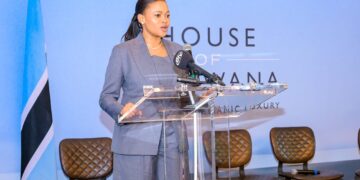- Tsaone Segaetsho
Renowned diamond industry analyst and vocal advocate for natural diamonds, Avi Krawitz, has told The Executive Botswana that the future of natural diamonds is “just bright”. His optimism is underpinned by expectations that Botswana, already a key player in the sector, will assume an even more pivotal role, particularly in light of the anticipated sale of De Beers.
“I expect Botswana to push to promote natural diamonds and for the industry to evolve significantly,” Krawitz said in an exclusive interview following his attendance at the prestigious JCK Jewellery Show in the United States.
Krawitz was part of the audience when Botswana’s delegation unveiled the House of Botswana concept, centred around the country’s “Diamond Story”. He observed a strong reception: “There was interest and awareness around Botswana’s story,” he noted, highlighting the JCK Show as an ideal platform for Botswana to enhance its natural diamond narrative, as it facilitates direct engagement between retailers and consumers.
He believes that with sustained marketing efforts to drive demand for natural diamonds, especially amid softer market conditions in China and India, increasing pressure from synthetic alternatives, and broader geopolitical uncertainties, the House of Botswana has made an encouraging start.
Botswana’s Minister of Minerals and Energy, Hon. Bogolo Kenewendo, confirmed to The Executive Botswana that House of Botswana is not a one-off initiative, but a long-term campaign. This came in response to Krawitz’s query about the future of the platform. “It was launched; now it’s a matter of seeing how the American consumer responds,” Krawitz added.
He emphasised the need to further stimulate demand, given Botswana’s economic reliance on natural diamonds. “House of Botswana is designed to do just that. Time will reveal its impact.”
Addressing underperformance in major Asian markets, Krawitz recommended that Botswana replicate its US marketing strategy in China and India. However, he acknowledged that the United States remains the largest consumer market for diamonds, justifying the country’s initial focus and heavier investment there.
Turning to the more contentious matter of the potential sale of De Beers, reportedly imminent this July, Krawitz refrained from speculating on potential buyers. “Much of it remains conjecture,” he said, noting that even De Beers CEO Al Cook declined to disclose details when approached, only stating: “There is a healthy level of interest. Anglo American has a lot of groups coming forth.”
Amid speculation that Botswana may seek to increase its stake in De Beers, Krawitz warned against majority ownership. “Botswana might raise its stake to 25 percent, but it should not become a majority shareholder,” he advised. “The value of De Beers has declined significantly over the years, and acquiring a controlling stake would be expensive and risky for the government.”
Dr Keith Jefferis, a leading local economist, echoed this sentiment, telling The Executive Botswana that it would be fiscally unwise for the government to invest further in what is currently a loss-making enterprise. He cited De Beers’ decline in value since the Oppenheimer family exited in 2011, leaving Anglo American and the Government of Botswana as joint shareholders.
“Botswana had pre-emption rights to increase its stake to 25 percent at that time but chose not to. It would be equally risky now,” said Dr Jefferis. “The government already has a significant stake and two seats on the De Beers board. Rather than expanding its shareholding, Botswana should continue its support for branding and marketing initiatives such as those seen at the JCK Show.”
Meanwhile, speaking at the Rapaport JCK Breakfast, media mogul Martin Rapaport engaged CEO Al Cook in a conversation on the future of De Beers. Cook stated: “The most important thing is that we have two shareholders who care deeply about the future of De Beers. As they work toward the sale, Anglo American is invested in the legacy of a company it has supported for over a century. From Botswana’s perspective, it has every right to help shape the future ownership of De Beers, given its passion for the industry’s future.”
Adding a strategic perspective, diamond value chain consultant Khulekani Jenamiso told The Executive Botswana that the country has a “golden opportunity” to shift from a focus on equity to national wealth creation through beneficiation and brand ownership.
“There needs to be a strategic pivot, from shareholding to nation-building,” he said. “Instead of deepening its equity stake in De Beers, Botswana should channel resources into a Diamond Industrialisation Public-Private Partnership (PPP) initiative. Such a programme would build long-term value by cultivating a globally competitive, Botswana-branded diamond jewellery industry that empowers Batswana across the value chain.”
As the global diamond industry undergoes structural shifts, Botswana appears poised to play a decisive role in shaping its future, through smart marketing, policy restraint, and an unwavering commitment to national beneficiation.










